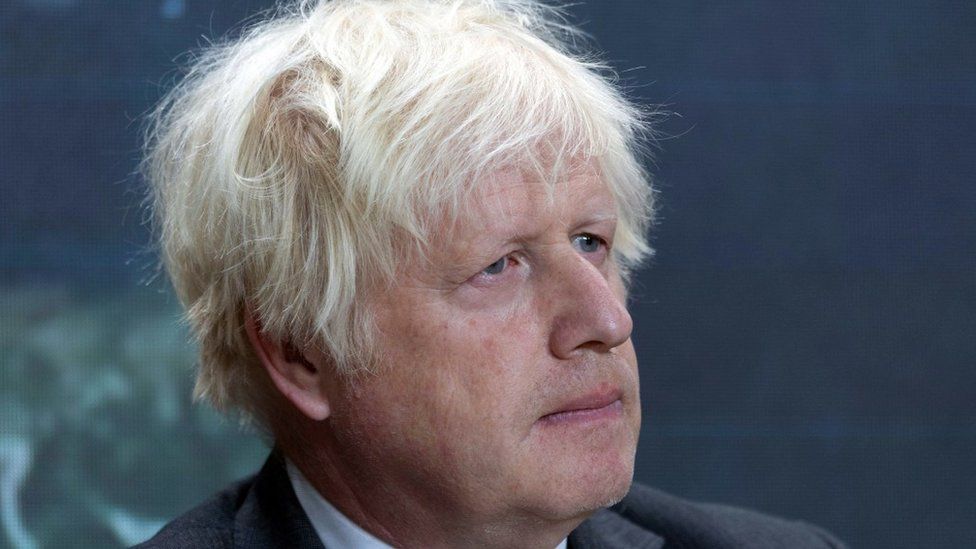Boris Johnson wanted to be injected with Covid on TV - ex-adviser
- Published

Boris Johnson "wanted to be injected with Covid-19 on television" to calm public fears, an ex-aide has said.
The claim - by Lord Lister - came in a witness statement to the Covid inquiry.
He said Mr Johnson "suggested to senior civil servants and advisers that he wanted to be injected with Covid-19 on television to demonstrate to the public that it did not pose a threat".
It was "at a time when Covid was not seen as being the serious disease it subsequently became", he added.
He said it was an "unfortunate comment" that had been "made in the heat of the moment".
He also confirmed his former boss had said letting "the bodies pile high" was preferable to another lockdown.
The remark was made in September 2020 but first reported in April 2021,
At the time, Mr Johnson dismissed the report, calling it "total rubbish".
Lord Edward Udny-Lister said the comment was made at a time when the government was "trying to avoid a further lockdown given the already severe impact on the economy and education".
On Tuesday, the Covid inquiry was also shown messages in which the head of the civil service Simon Case said of his Downing Street colleagues: "These people are so mad... they are just so madly self-defeating. I've never seen a bunch of people less well-equipped to run the country."
And entries from the 2020 diaries of Sir Patrick Vallance revealed that the then-chief scientific advisor felt Mr Johnson was "all over the place" on the issue of implementing a second lockdown.
Lord Lister is a long-time ally of Mr Johnson, having worked with him during his time as mayor of London and prime minister.
In his evidence session to the Covid inquiry, which lasted over two hours, Lord Lister was asked about the atmosphere in the Downing Street operation.
Last week, Helen MacNamara, a senior civil servant during the Covid pandemic, said there had been a "macho" culture and that a "toxic" environment had affected decision-making.
Lord Lister said: "I think there was a lot of tension that was taking place" adding that Dominic Cummings, another senior adviser in Downing Street, was "not an easy man to deal with".
Opportunistic?
Later in the session, Lord Lister was asked about the UK government's relationship with the devolved administrations in Scotland and Wales during the pandemic.
He said there had been "a great deal of mistrust and frustration" towards the Scottish government.
"It seemed to us in Downing Street, it didn't matter what the decision was, Scotland would want to do things slightly differently."
Asked if he felt the Scottish government was being "opportunistic", Lord Lister said "I think that is a good word".
He later added that Mr Johnson and Nicola Sturgeon, who was Scotland's first minister during the pandemic, "generally didn't like each other very much".
Questioned on the second lockdown, introduced in November 2020, Lord Lister suggested it could have been avoided if the tier system had been given more time to work.
Under the tier system, areas where subject to different restrictions depending on the prevalence of the disease. It was essentially made redundant around a month after being introduced, when Mr Johnson implemented a second national lockdown.
Lord Lister said the tier system was "messy but the right thing to do" adding: "If we kept going I believe it would have worked."
'Whisky and revolver'
Earlier in the day, the Covid inquiry had seen further extracts from a diary written in October 2020 by the government's then chief scientific adviser Sir Patrick Vallance.
The note says Mr Johnson and Rishi Sunak, who was chancellor at the time, were both "clutching at straws" while trying to argue against a second lockdown in October 2020.
Sir Patrick describes a meeting on 8 October as, "very bad".
After being shown the final slide in a presentation by the Covid-19 Taskforce, Sir Patrick wrote that Mr Johnson responded, "Whisky and revolver."
"He was all over the place", Sir Patrick says, adding that Mr Sunak was using "increasingly specific and spurious arguments against closing hospitality".
In another diary entry from 25 October, Sir Patrick says Mr Johnson "owns the reality for a day and then is buffeted by a discussion with [the chancellor]."
Simon Ridley, former Head of the Cabinet Office Covid taskforce also gave evidence to the inquiry on Tuesday.
He admitted the taskforce was not asked about the Eat Out To Help Out scheme introduced by Mr Sunak in summer 2020.
The scheme gave diners up to 50% of their bill off and was aimed at bolstering the hospitality industry, however some scientists have argued it helped the virus spread.
Asked whether his team had been "completely blindsided by the Treasury", Mr. Ridley responded, "correct."
The inquiry is taking witness evidence in London until Christmas, before moving to Scotland, Wales and Northern Ireland.
On Wednesday, it will hear from Sir Mark Sedwill who headed the civil service from April 2018 to September 2020.
- Published6 November 2023
- Published4 November 2023
- Published1 November 2023
- Published25 April